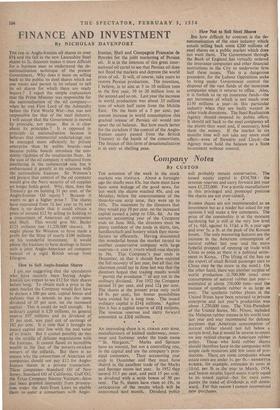FINANCE AND INVESTMENT By NICHOLAS DAVENPORT THE rise in Anglo-Iranian
oil shares to over £92 and the fall in the new Lancashire Steel shares to 2s. discount makes it more difficult for a business man to understand the de- nationalisation technique of the present Government. Why does it insist on selling back to the public its steel shares which no one wants and persist in its refusal to sell its oil shares for which there are ready buyers ? I reject the simple explanation that the Prime Minister was responsible for the nationalisation of the oil company— when he was First Lord of the Admiralty before the First World War—but was not responsible for that of the steel industry. I will accept that the Government is moved by principle, not pique. But is it clear about its principles ? It is opposed in principle to nationalisation because it believes that commercial undertakings can be managed more efficiently by private enterprise than by public boards—and because public boards introduce the eco- nomic rigidities of the totalitarian State. In the case of the oil company it refrained from interfering in the commercial side but it embarrassed it greatly in its relations with the nationalistic Iranians. Sir Winston's old pretext that control of the oil company would give the Navy security of oil supplies no longer holds good. Why, then, does the Treasury go on holding 51 per cent. of the Anglo-Iranian Oil equity ? Because it wants to get a higher price ? The shares have recovered from 51 last year to 9* and there is no doubt that it could obtain a price of around £12 by selling its holding to a consortium of American oil companies 11 ,, and Shell. This would give Mr. Butler 125 millions (on 11,250,000 shares). It might please Sir Winston to have made a Troth for the State of nearly £100 millions ' on his wonderful investment. It would please the Iranians to have dealings in future with a joint Anglo-American oil company • instead of a rigid British set-up from , Glasgow.
How to Sell Anglo-Iranian Shares
I am not suggesting that the speculators who have recently . been buying Anglo- , `Iranian'can expect to see £12 for their shares before long. To obtain such a price in the open market the Company would first have to declare a 100 per cent. capital bonus and indicate that it intends to pay the same dividend of 35 per cent, on the increased capital. This it could do well enough. Its ordinary capital is £20 millions, its general reserve £97 millions and its dividend of 35 per cent. was paid out of earnings of 182 per cent. It is time that it brought its issued capital into line with the real value of its assets. But it cannot possibly do this in the middle of delicate negotiations with the Iranians. It cannot flaunt its incredible wealth in the face of the poverty-stricken owners of the oilfields. But there is no reason why the consortium of American oil companies should not pay 112 for Anglo- Iranian shares in a private transaction. These companies—Standard Oil of New Jersey, Standard Oil of California, Gulf Oil, the Texas Company Sdcony Vacuum—have just been granted immunity from prosecu- tion under the Anti=frust Laws to enable them to enter a consortium with Anglo-
Iranian, Shell and Compagnie Francaise de Petroles for the joint marketing of Persian oil. It is in the interests of this great inter- national oil cartel to see that Persian oil does not flood the markets and depress the world price of oil. It will, of course, take years to restore Persian production. The intention, I believe, is to aim at 5 to 10 million tons in the first year, 10 to 20 million tons in the second and so on. Last year the increase in world production was about 33 million tons of which half came from the Middle East. On the basis of a 5 per cent. per annum increase in world consumption this gradual release of Persian oil would not upset the oil balance. But how much better for the cartelists if the control of the Anglo- Iranian equity passed from the. British Treasury to the hands of the consortium. The finance of this form of denationalisation is as easy as shelling peas. How Not to Sell Steel Shares But how difficult by contrast is the de- nationalisation of .the steel industry which entails selling back some £200 millions of steel shares on a public market which does not want them. The Government through the Bank of England has virtually ordered the insurance companies and other financial institutions in the City to underwrite firm half these issues. This is a dangerous precedent, for the Labour Opposition seeks to bring under Government control the disposal of the vast funds of the insurance companies when it returns to office. Also, it is foolish to tie up insurance funds—the net increment of which is not much over £150 millions a year—in this particular industry when they are badly wanted in other trade directions. The Steel Realisation Agency should suspend its public offers. It should sell back to the steel companies all the plants they want and, if necessary, lend them the money. If the market in six months time will not take any more steel offers—even of Stewarts and Lloyd—the Agency must hold the balance as a State investment without control.


































 Previous page
Previous page